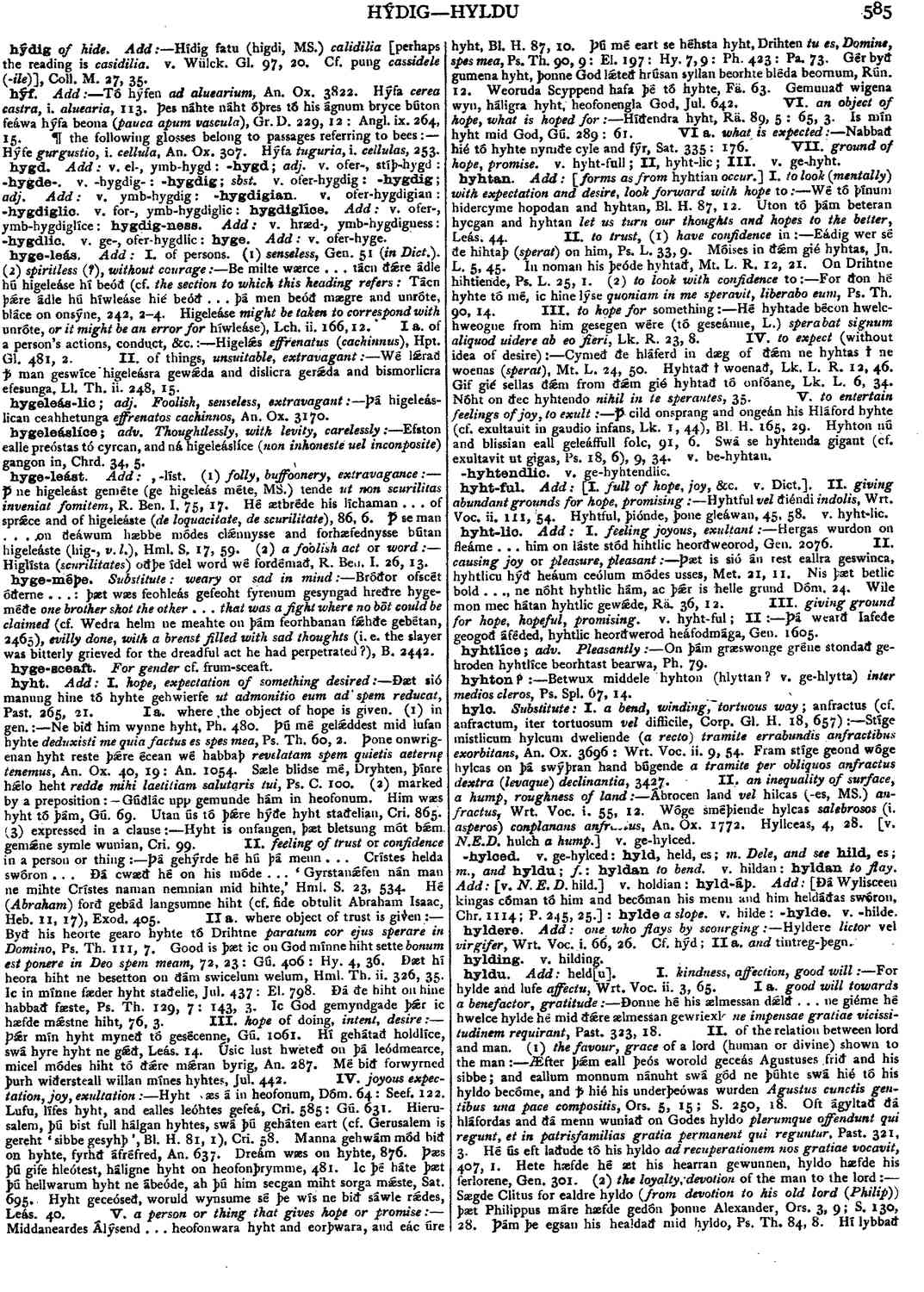hyldu
-
For hylde arid lufe affectu, Wrt. Voc. ii. 3, 65. I a. good will towards a benefactor, gratitude :-- Ðonne hé his ælmessan dǽld. . . ne giéme hé hwelce hylde hé mid ðǽre ælmessan gewriexl
ne impensae gratiae vicissi-tudinem reguirant,
- Past. 323, 18.
-
Æfter þǽm eall þeós worold geceás Agustuses . frið and his sibbe; and eallum monnum nánuht swá gód ne þúhte swá hié tó his hyldo becóme, and ꝥ hié his underþeówas wurden
Agustus cunctis gen-tibus una pace compositis,
- Ors. 5, 15 ; S. 250, 18.
-
Oft ágyltað ðá hláfordas and ðá menn wuniað on Godes hyldo
plerumque offendunt qui regunt, et in patrisfamilias gratia permanent qui reguntur.
- Past. 321, 3.
-
Hé ús eft laðude tó his hyldo
ad recuperationem nos gratiae vocavit,
- 407, l.
-
Sægde Clitus for ealdre hyldo (
from devotion to his old lord (Philip)
) þæt Philippus máre hæfde gedón þonne- Alexander, Ors. 3, 9; S. 130, 28.
-
Þám be egsan his healdað mid hyldo,
- Ps. Th. 84, 8.
-
Hí lybbaðon écnysse mid þám heáhfæderum for heora hylde wið God,
- Hml. S. 25, 740.
-
Ic þé mín gehát, . . . hyldo gylde
vota tua quae reddam
,- Ps. Th. 55, 10.
-
For eówrum hyldum þé gé mé symble cýddon,
- Ll. Th. i. 276, 19.
-
Ic wæs ðínum fæder fullíce hold on móde and on mægene, and ðé ǽfre on fullum hyldum hold and on fulre lufe, C. D. iv. 301, l. (2 a) on hyldum
(with gen.) as the vassal or officer
of a person :-- Hé fór on þæs cynges heldan (in loco regis, Florence of- Worcester, Chr. P. ii. 282) uppon heora bróðer, Chr. 1095; P. 230, 18.
-
His mæg Eádgár hé þǽr on þæs cynges Willelmes heldan tó cynge gesette, 1097; P. 234, 15. (2 b)
devotion
to the service of a lord :-- Hire hyrdeman ðurh holdrǽdene sume ác ástáh, and his orf lǽswode . . . and hé hearde feóll, gewát of worulde tó Gode for ðǽre hylde his hirdrǽdene,- Hml. Th. ii. 150, 33.
-
Swá ic áge Pharaones helde, ne farað gé heonon
per salutem Pharaonis non egrediemini hinc.
- Gen. 42, 15.
- ' Ic hálsige eów for þæs Cáseres helda ꝥ gé mé secgon hwæðer hé of forligere sig ácenned. ' Hig cwǽdon: ' Hyt nys ná on úre ǽ álýfed tó swerigenne, and swá ðéh swá wé þæs Cáseres helda habban móton and swá wéé
-
Gecýþe seó gewitnysse ꝥ on Godes helde and on hláfordes (the Latin versions have in fide (fidelitate) Dei et domini sui; per sacramentum), ꝥ heó him on sóðre gewitnysse sý (
for the forms of oaths see
pp. 178 sqq.),- Ll. Th. i. 388, 23.
-
Gehýrde hé hú þá menn him betwýnan sprǽcon and oft and gelóme Crístes helda swóron (
swore by Christ ?
),- Hml. S. 23, 529.
Bosworth, Joseph. “hyldu.” In An Anglo-Saxon Dictionary Online, edited by Thomas Northcote Toller, Christ Sean, and Ondřej Tichy. Prague: Faculty of Arts, Charles University, 2014. https://bosworthtoller.com/53696.
Checked: 0